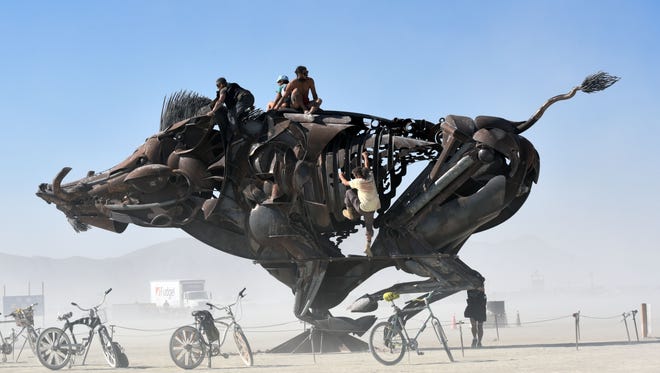Itch to build (with a hammer) lasts long after Burning Man

The dust has settled, the techno turned down and everyone is clothed again: Burning Man is over for another year.
But while the event itself may be finished until 2017, the spirit of invention and camaraderie keeps going for many of the technology workers who got a chance to shut their laptops and pick up a hammer, working with hands accustomed to just pounding keyboards.
“You get rid of the computer and still hone your craft,” said Paul Engel, an engineer who works for SurveyMonkey, the Palo Alto, Calif.-based online polling service. “It just changed my world upside down.”
Engel tells me his story while wearing shiny gold pants, taking a break from hammering in a stake bearing a crucified Barbie doll that's part of an art display showing dolls marching into ovens. Meant to mimic Nazi gas chambers, it's designed to shock and offend — think punk rock in the desert — and it's a longtime fixture at Burning Man.
This entire event isn’t, generally, for the weak of heart. It’s a weeklong festival in the Middle of Nowhere, Nev. with limited mobile phone reception and an environment that’s decidedly hostile to modern electronics. There’s no Uber, no push-button ordering of food or dry cleaning or Tesla chargers or any of the other mod-cons city-dwellers so often take for granted.
That’s kind of the point.

Like many people I talked to over the course of a week, Engel says he loves the sense of community created by the shared experience in the desert, especially when it’s connected to building things. Here, participants create elaborate themed camps, erecting fabric domes and three-story staircases, miniature Eiffel Towers and stages with dance lights stabbing high into the dusty sky.
And people just accept who you are. Want to wear a wedding dress and parade down the street with a dozen other brides? No problem. Want to walk around naked with a megaphone, yelling encouragement at the brides? Go for it.
For the teeshirts-and-jeans crowd who commute from San Francisco to Silicon Valley on wifi-enabled private buses, there's a real opportunity to be someone else, even just for a few days.
It’s easy to see the attraction — and the influence — of Silicon Valley at Burning Man. Thousands of Facebook, Google and other workers at smaller tech companies help populate this encampment, and while branding is off limits, the stamp of well-heeled high tech is is everywhere.
These include the money needed to keep some of the most elaborate camps operating and the dance music pumping from the two-story-tall “art cars” loaded with sound systems.
“You have such genius here that is bored by everyday circumstance,” Engel says.

“They’re building something that’s never existed before,” said Dan Greening of Santa Cruz. Greening, a PhD computer scientist, is a longtime Burning Man attendee with credentials that include IBM and Skype. “This environment gives people the freedom to think outside the box.”
That innovation trickles out into the “default world” the rest of us live in. The Couchsurfing website and app was founded from the Burning Man culture of “gifting,” and Elon Musk has credited his time at Burning Man with the idea behind Solar City. If nothing else, techies come out of the desert having spent a week watching what everyone else is building, and juiced with creativity from the experience.
The notion of building and builders is a popular one in high-tech now. Microsoft holds a annual Build conference. #Builtbygirls prepares young women for careers in tech. Carl Bass, the CEO of Autodesk, wants the legions of DIY tinkerers to use his design software, not just professional architects. And Internet giant Facebook recently built a massive hardware lab, complete with heavy machine tools.
All the way back in 1998, the very first Google Doodle was the Burning Man logo, a sign to users that the founders of the then–new company, Larry Page and Sergey Brin, were out of the office and living on the playa for a week.
After one of my reporting visits to a Burning Man camp, an organizer confided that one of the heavily costumed participants was Brin himself, a fact Google/Alphabet declined to confirm or deny.
And that’s one undeniable fact about Burning Man: no one really knows who you are. People take on playa names like ChaCha or Chino Loco or RonJon, in part to protect their identities in the “default” world. In the camp where Brin was rumored to be eating French toast, doctors and psychiatrists wearing nothing but banana-hammock style briefs and goggles mingled with Steven Gluckstern of Santa Fe. I first met Gluckstern while he was wearing a top hat and a satin smoking jacket. He doesn’t tell me, at least not right away, that’s he’s also the CEO of a neuroscience company and a Stanford MBA.

Gluckstern says he values Burning Man’s egalitarianism, although he also acknowledges that pretty much only the relatively wealthy can attend. Still, he says it’s a chance to see what society could look like, which helps attendees set better priorities once they leave.
"Here what you discover is that what you think about people is inevitably wrong,” he says.
As the ashes of the burning Temple cooled in the desert, a Burner who calls herself “Eeeve” picked through the metal scraps, twisting them into hearts she was then handing out. A former corporate worker who didn’t want to use her real name, Eeeve said Burning Man forces most attendees to reprioritize their needs. On her sixth burn, Eeeve this year got a free shower from a friend for a birthday present. Showers are in short supply at Burning Man.
“In the days of having everything push-button at your fingertips, you have to bring your own water,” she said. “You get home and you appreciate the things you didn’t before.”

Trevor Hughes is Denver correspondent for USA TODAY. Follow him @Trevorhughes.